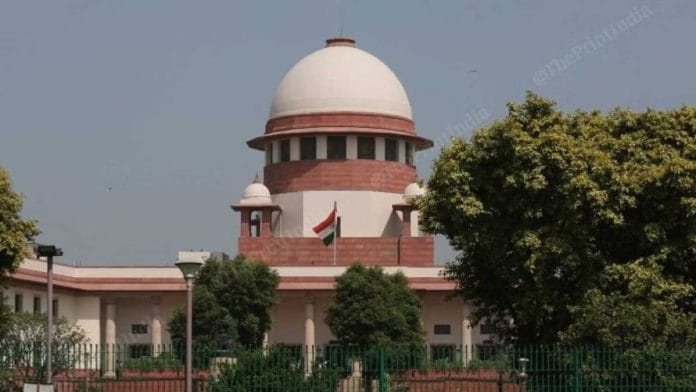New Delhi: A 94-year-old man from Bihar has urged the Supreme Court to set aside its December 2024 settlement order in a decades-old property dispute case, saying that he had never entered into an agreement with the opposite party.
In his application alleging impersonation, forgery and fabrication, Harish Jaiswal has claimed the court’s 13 December settlement order notes his approval, through a lawyer.
But he neither entered into any agreement, nor hired an advocate to represent him in the case before the top court, the Muzaffarpur nonagenarian contended.
Alleging the proceedings took place in his absence and without his knowledge, the petitioner wants the SC to hear him and take back the order, which, he said, will hamper his chances of acquiring the possession of the disputed property, which has been under litigation since 1989.
Since the lawyer who purportedly argued for him has been named in the case records, Jaiswal has first sought his discharge from the matter. On 17 March, the SC issued notice to the lawyer whose name appears in the December order as Jaiswal’s counsel. He has been asked to appear in the court to furnish an explanation as to why Jaiswal’s plea to allow his application to free the counsel not be allowed.
According to the SC rules, if a litigant wants to hire a new lawyer, they have to get a no-objection certificate from the previous advocate, agreeing to relinquish his services. Even though Jaiswal claims not to have hired the lawyer, he had to ask for a discharge of the said advocate in accordance with the apex court rules.
Recalling the entire sequence of events leading to the court’s order, Jaiswal pointed to a conspiracy, which, he claimed, was “designed to unlawfully obtain an order from” the SC without the participation of the rightful party. “Such blatant abuse of legal mechanisms cannot be permitted,” he submitted in his petition in January.
This is the second complaint of alleged impersonation in the top court. Last year, in a case related to Ajay Katara, a prime witness in the Nitish Katara murder, the top court had come across a similar allegation against lawyers.
While Ajay Katara had got relief from the Allahabad High Court that dropped the rape charges against him, the victim’s father appeared before the top court and denied signing any document to authorise a lawyer to either file or argue the case on his behalf.
Subsequently, the top court ordered the Central Bureau of Investigation (CBI) to register a case to find out the conspiracy, if any, planned to implicate Katara in the rape case.
As for Jaiswal, a dispute arose over a purported agreement (Mahadnama) signed between him and Bipin Bihari Sinha, who claimed to have purchased the former’s property for Rs 63,000. The agreement was apparently signed on 26 December, 1986, discloses his application. ThePrint has a copy of this document.
When Jaiswal questioned the authenticity of the agreement, Sinha initiated legal proceedings in which he asserted the contract should be executed because he had made full payment to the seller.
But the trial court dismissed Sinha’s case, holding that the agreement was neither genuine nor duly executed. One of the witnesses named in the agreement refused to support Sinha in the court. Several discrepancies were also found in Sinha’s statement, raising doubts about the agreement’s authenticity.
The first appellate court affirmed the lower court’s findings and observed Sinha failed to establish that the agreement to sell was executed in accordance with law. It was also concluded that Sinha had not only failed to prove the execution of the contract, but had also misled the court through “forged and fabricated” evidence.
Upon second appeal before the Patna High Court, Sinha’s attempts to challenge the concurrent findings of two lower courts did not succeed.
Since the entire case was based on facts, the HC did not delve into its merits and upheld the declarations given by the trial courts. The proceeding before the HC culminated into an order pronounced on 15 July, 2024.
Jaiswal’s application claimed that he learnt about Sinha moving the top court when his son-in-law, while researching on “execution proceedings in civil cases” on a legal website, came across the top court’s December order.
He said he was “left utterly shocked” and “appalled” to learn that Sinha had filed an appeal in the SC, which set aside the trial court and HC orders in his absence. On perusing the official website of the top court, he also learnt that a caveat had been filed on his behalf in the matter, even as he never authorised any advocate to do so.
Going by the “agreement” that became the basis of SC’s December order, Jaiswal concedes to having received the payment and agrees to handover the property’s possession to Sinha. This agreement was purportedly signed between the two in October 2024, after Sinha moved his appeal in the apex court.
Claiming he had no prior knowledge of any legal proceedings in the SC, Jaiswal’s application stated that he is contesting eviction execution proceedings against Sinha that was last heard on 7 December, 2024. Then, Sinha had sought an adjournment on the ground of his wife being unwell.
The case was instituted “fraudulently, by placing on record a settlement agreement with Jaiswal’s forged and fabricated signature, thereby committing an act of misrepresentation and deception with the intent to mislead the top court,” Jaiswal’s application contended.
(Edited by Tony Rai)
Also Read: Hidden in plain sight: The unanswered questions in the Justice Varma cash controversy






